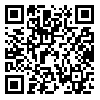Volume 3, Issue 1 (Spring 2003)
Iranian Journal of Medical Education 2003, 3(1): 5-13 |
Back to browse issues page
Download citation:
BibTeX | RIS | EndNote | Medlars | ProCite | Reference Manager | RefWorks
Send citation to:



BibTeX | RIS | EndNote | Medlars | ProCite | Reference Manager | RefWorks
Send citation to:
Adibi P, Nik-kholgh B, Esmaeeli A, Sima H R, Zali M R. Using Case Discussion for Resident Training. Iranian Journal of Medical Education 2003; 3 (1) :5-13
URL: http://ijme.mui.ac.ir/article-1-173-en.html
URL: http://ijme.mui.ac.ir/article-1-173-en.html
Abstract: (19966 Views)
Introduction. Despite growing evidence in the field of undergraduate medical education, there is not much data on resident training. Case presentation is a useful tool for scientific clinical education which along with evidence based medicine will become an interactive training method. So, the goal of this study was to compare traditional educational methods with hard talk and their role in learning process, based on residents' viewpoints. Methods. In a pre-experimental study, special monthly case discussion sessions (named "Hard talks on gastroenterology") were designed for internal medicine residents of Shaheed Beheshti University of Medical Sciences. Then the data were collected using an attitude measurement questionnaire. Each educational case was started with a title followed by history, physical examination data, as well as paraclinical lab results, respectively. The scenario ended with a definite clinical question about next needed test, diagnosis or treatment. After the sixth session, questionnaires were distributed non-randomly among 50 participants and 31 questionnaires were completed. The data were analyzed by SPSS 11 using frequency distribution and Kruskal Wallis. Results. Residents were more positive toward Hard talks. They evaluated the possibility of challenge with speakers 54.8%, learning the presented subject during the session 80.6%, the compatibility of the subject with residents' real needs 77.4%, the possibility of using the attending physician experiences 77.2%, volume of knowledge transfer in a session 67.7%. The participants considered the Hard talks better than traditional methods. Conclusion. In general, this study showed a relatively successful experience in resident training. Due to the lack of new methodologies in resident education this can be used as a guide for designing new interventions in the field.
Type of Study: Original research article |
Received: 2006/09/6 | Accepted: 2003/06/15 | Published: 2003/06/15 | ePublished: 2003/06/15
Received: 2006/09/6 | Accepted: 2003/06/15 | Published: 2003/06/15 | ePublished: 2003/06/15
| Rights and permissions | |
 |
This work is licensed under a Creative Commons Attribution-NonCommercial 4.0 International License. |




